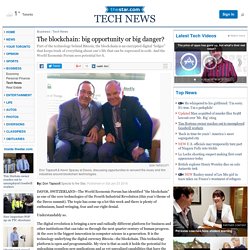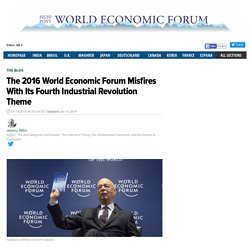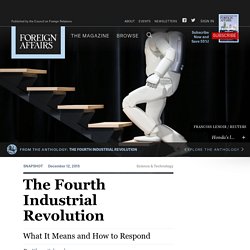

Des hôpitaux canadiens sous-traitent les analyses radiologiques en Inde. Un reportage de Thomas Gerbet, correspondant en Inde.

Selon nos informations, au moins six hôpitaux canadiens, sans doute davantage, sous-traitent le travail des radiologistes en Inde, la nuit et le week-end. Radio-Canada a aussi appris qu'une entreprise indienne leader dans le domaine, Teleradiology Solutions, tente actuellement de percer le marché canadien et s'y développer. We Can’t Let John Deere Destroy the Very Idea of Ownership. It’s official: John Deere and General Motors want to eviscerate the notion of ownership.

The 'Limitless Pill' Could Soon Turn Us All into Superhuman Workers. A pack of modafinil.

Photo by the author Wouldn't your career be going better if you could actually concentrate? Mine would. New Law Requires all Dogs in the UK to be Microchipped. In Brief As of April 6, 2016, UK law requires all dogs that are eight weeks old or older to have microchip implants.

Microchips will address "reckless" ownership, as well as save taxpayers' cash that would otherwise be used to look after strays. The blockchain: big opportunity or big danger? DAVOS, SWITZERLAND—The World Economic Forum has identified “the blockchain” as one of the core technologies of the Fourth Industrial Revolution (this year’s theme of the Davos summit).

The topic has come up a lot this week and there is plenty of enthusiasm, hand-wringing, fear and our-right denial. The digital revolution is bringing a new and radically different platform for business and other institutions that can take us through the next quarter century of human progress. At the core is the biggest innovation in computer science in a generation.
The 2016 World Economic Forum Misfires With Its Fourth Industrial Revolution Theme. Global business leaders, heads of state, public intellectuals, and NGO's will be making their annual pilgrimage to the tiny ski resort village of Davos, Switzerland on January 20th through 23rd.

The forum is a unique venue crafted by the German economist Klaus Schwab more than 40 years ago. Its primary mission is to engage the world's elite in future forecasting, with the objective of preparing them for "the next big thing. " While the central theme of each year's forum is often spot on and, more often than not, inspiring and thought-provoking, occasionally the forum misfires. This year, the central theme is the Fourth Industrial Revolution. The Fourth Industrial Revolution. We stand on the brink of a technological revolution that will fundamentally alter the way we live, work, and relate to one another.

In its scale, scope, and complexity, the transformation will be unlike anything humankind has experienced before. We do not yet know just how it will unfold, but one thing is clear: the response to it must be integrated and comprehensive, involving all stakeholders of the global polity, from the public and private sectors to academia and civil society. Jamie Bartlett: How the mysterious dark net is going mainstream. Michio Kaku : Est-ce que la NanoTechnologie pourrait concevoir l’abondance ?
Dr Kaku, un scientifique mondialement reconnu, aborde la question de la possibilité de l’utopie, une société s’approchant de la perfection, que beaucoup ont essayé de créer à travers l’Histoire.

Ces rêves n’ont pas pu devenir réalité à cause de la rareté. Cependant, nous avons maintenant la nanotechnologie. Big nanotech: towards post-industrial manufacturing. What if nanotechnology could deliver on its original promise – not only new, useful, nanoscale products, but a new, transformative production technology able to displace industrial production technologies and bring radical improvements in production cost, scope, and resource efficiency?

What if we could raise the global material standard of living above that of today's richest nations, while reducing impacts on Earth's environment? What if we could manage a more rapid transition to zero net carbon emissions, and (yet more challenging) could afford to build the systems that would be required to capture, compress, and remove a trillion or so tonnes of industrial-era CO2 from the atmosphere? The technology in question is "high-throughput atomically precise manufacturing" (APM), a prospect that will develop from technologies that will emerge from progress in atomically precise fabrication – progress with ongoing and surprising achievements today. The risks of letting algorithms judge us (Opinion) Human judgment is being replaced by automatic algorithms, and that brings with it both enormous benefits and risks.

The technology is enabling a new form of social control, sometimes deliberately and sometimes as a side effect. And as the Internet of Things ushers in an era of more sensors and more data -- and more algorithms -- we need to ensure that we reap the benefits while avoiding the harms. Right now, the Chinese government is watching how companies use "social credit" scores in state-approved pilot projects.
Ethereum Will Arrive (and 15 Other Blockchain Predictions for 2016) Andrew Keys is the director of communications of ConsenSys and co-founding member of ConsenSys Enterprise, the consulting group within ConsenSys. Previously, Andrew worked for UBS in equities analysis. Here, he offers 16 predictions for the blockchain and decentralized technologies sector in 2016. Le culte du techno-populisme, par Evgeny Morozov (Les blogs du Diplo, 4 janvier 2016) Dans Le culte du partage, un essai fascinant paru en août 2014, Mike Bulajewski, un designer de Seattle féru de psychanalyse, explique que la meilleure manière de comprendre l’attachement émotionnel porté par des millions de consommateurs à des sociétés telles que Uber ou Airbnb — gratifiées de l’appellation flatteuse d’« économie du partage » — consiste à l’appréhender comme un culte religieux.
Comme tout objet de culte, ces multinationales répondent à notre besoin intime d’appartenance et de solidarité. Elles nous promettent un monde qui redonnera du sens à nos vies. En faisant passer leurs détracteurs pour des arriérés qui rêvent de détruire une nouvelle classe d’entrepreneurs épris d’audace et d’innovation, elles remettent en service le vieux refrain du pionnier persécuté. GAFAnomics: New Economy, New Rules. GAFAnomics Season 2, 4 superpowers to outperform in the Network Economy. In the new study GAFAnomics, FABERNOVEL identifies 4 superpowers to outperform in the Network Economy. Understand how to become a ” Magnetic”, ” Real Time”, “Intimate” or ” Infinite ” company: 4 economic superpowers inspired by the GAFA model. FABERNOVEL released a new study analyzing the strategic practices of the GAFA companies. The study, which presents actionable lessons for legacy industries looking to reshape their strategy for the New Economy, finds that the fastest-growing superpowers in the Network Economy position themselves as Magnet, Intimate, Real Time, or Infinite Enterprises.
FABERNOVEL’s 2014 report, GAFAnomics: New Economy, New Rules detailed how Google, Apple, Facebook, and Amazon – GAFA – are driven by a common vision of a borderless market and a customer culture which redefined their notions of value creation, core business, and talent management. Read our Press Release. Mission-Oriented Finance for Innovation. 20150302 momentum for europe rifkin en. Après les critiques, le bitcoin séduit Wall Street. Satoshi Nakamoto, l’inventeur du bitcoin, la monnaie numérique circulant sur Internet, vient d’être présélectionné pour le prix Nobel d’économie 2016. Cette candidature est soutenue par l’économiste américain Bhagwan Chowdhry, professeur à l’université de Californie à Los Angeles et membre du groupe de présélection des candidats à la récompense. Sur son blog, M. Chowdhry explique ce choix : Inside Mark Zuckerberg's Bold Plan For The Future Of Facebook. "Mark is fixing stuff.
" Just another WordPress site. Even if they are autonomous, Plantoids require the interaction of other species (humans) to subsist and reproduce themselves in a physical form. Why Tech Companies Are So Secretive About Self-Driving Cars. Self-driving cars occupy the cultural space once dominated by flying cars. Both are a kind of shorthand for “the future.” But while flying cars have become a symbol of a technological promise left unrealized, driverless cars are widely believed to be inevitable in the coming decades.
Leading tech companies say that bringing a fully autonomous car to the market is, in the words of the Tesla CEO Elon Musk, “a super high priority,” but it’s hard to know from the outside what most businesses are actually doing to get there. Private Blockchains vs The Bitcoin Blockchain. Articles liés Lately, there has been a huge spike in interest in private blockchains, particularly from banks and financial institutions. Some of them are already working on their own private blockchains to improve the efficiency of their services. How Italy’s Hacking Team Discovered the Future of Surveillance. “It looked very suspicious,” M says of an anonymous e-mail she and several other journalists received late in 2014. It promised a scoop about a government scandal, but something just didn’t sit right with her.
What Would a Futuristic Low-Carbon Tech World Actually Look Like? What Can We Call Blockchain To Help People Understand It? Understanding blockchain technology is not for the average person. Pirate Bay Founder: ‘I Have Given Up’ “The internet is shit today. The three constituent elements of the Decentralized Computing Revolution.